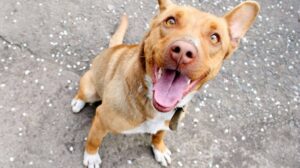
The Importance of Biotin for Dogs
Biotin is essential for dogs because it plays a role in cellular division and metabolism. It is also known as Vitamin H (skin), or vitamin B7. It should be a regular, integral part of any balanced dog’s diet.
Below, we will examine in detail what biotin does for dogs. The water-soluble vitamin’s most well-known effect is a beautiful, shiny coat. But biotin can do even more …
Why biotin for dogs is important
First, let’s go chemical: Biotin plays a crucial role in metabolic and cell division processes within our four-legged friend’s organism. Vitamin H is important for protein, carbohydrate, and fat metabolism. It also plays a role in the nucleus of cells. It regulates blood glucose levels, and, in the most visible way, ensures that the dog has a shiny, radiant coat. This is achieved by improving the skin, coat, and undercoat. Your sofa wolf will get enough vitamin H in his diet, whether you feed him mainly canned food or dry food. Biotin deficiency is possible in some cases.
Symptoms of biotin deficiencies in dogs:
Fortunately, it is rare. It can be recognized by these symptoms:
- The coat is dull and brittle
- Dandruff
- Itching
- Eczema
- Hair loss
- Lack of vitality in older quadrupeds
If you have any doubts, consult your veterinarian.
How much biotin do my dogs need?
Dogs produce a small amount themselves, but this is insufficient to meet the requirements. Therefore, it must also be ingested through dog food. It has been difficult to determine the exact amount of biotin required for dogs. The current daily requirement is estimated to be 2 micrograms for every kilogram of bodyweight. A 20-kilogram canine needs approximately 40 micrograms per day. Some veterinarians recommend taking more biotin, especially during the period of a coat change when the body’s need for it increases. Studies show that there is no danger of overdosing, as excess is excreted and the side effects are unknown.
What foods contain biotin
Many foods contain biotin, but in small quantities. In general, dogs and cats are less likely to absorb the vitamin if it is derived from grains. Animal products, such as calf, beef, or pig kidneys or liver, are best. Here’s a brief overview of biotin-rich foods and raw materials:
- Offal
- Soybeans
- Egg yolk
- Yeast
- Wheat germ
- Wheat bran
- Oat flakes
- Salmon
- Beef muscle meat
- Carrots
Biotin is a biotin source that should be avoided when using raw eggs
It is commonly said that if a dog has a biotin deficiency it should be given raw eggs. This home remedy is not to be used this way as the whole egg should not fed. Only the yolk contains vitamin. The egg white has a negative impact on biotin absorption, because it binds it in the body, making it useless.

